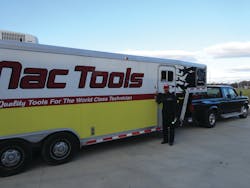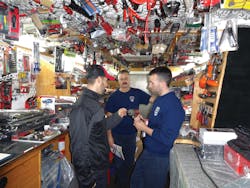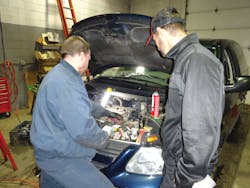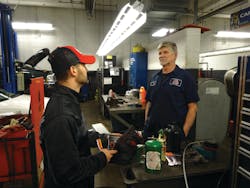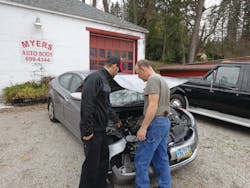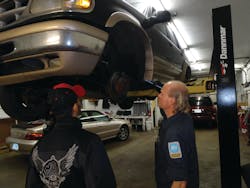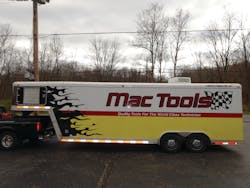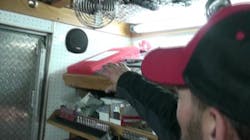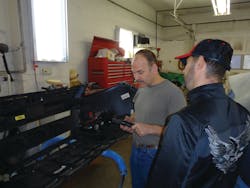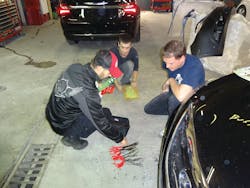Editor's Note: This article was orginally published Feb. 3, 2014. Some of the information may no longer be relevant, so please use it at your discretion.
For Scott Manning, a Mac Tools mentor distributor, there is no mystery to success in mobile tool distribution. Manning, based in Kent, Ohio near Akron, vigilantly focuses on “the basics” of the business. By paying careful attention to customer payment terms, collections, customer creditworthiness, what’s selling and his customers’ needs, Manning has managed to grow his business in double digits almost every year since he became a distributor in 1995.
But spend a day with Manning as he hauls his 30-foot trailer in a Ford pickup truck, and it becomes obvious that “the basics” are not a simple matter. The soft-spoken and business-like Manning brings a genuine interest in technicians’ tool needs when he arrives at each shop, and the technicians waste no time showing him what they are working on, knowing that he is all ears.
While talking with a technician doing an underhood repair recently, the customer realized his 8-year-old air ratchet wasn’t driving rivets properly. Manning took a close look at the rivets and was able to immediately suggest a ratchet that would do the job.
This interest in the customer’s daily tasks keeps Manning’s conversations focused on business when he visits his stops. Customers know that Manning wants them to be able to do their repairs efficiently. This has fostered a high level of customer loyalty, which is evident inside his spacious, well-stocked trailer, with numerous Mac Tools sales awards adorning the walls. An even greater testament is the role Manning has assumed as a distributor mentor; he has mentored six other distributors over the years, most of whom he keeps in touch with.
Manning doesn’t dismiss other attributes a mobile distributor needs to succeed, such as strong verbal communication skills and inventory management. He gained these skills in his early work years, and he believes it gave him a good foundation for mobile tool sales.
He may have even inherited some sales skills from his father, a billboard advertising salesman.
But when pressed to say what the most important characteristic a person needs to succeed in mobile tool sales, Manning has a ready answer:
“All of it goes to drive,” he says. “You’ve got to be driven to do this. You cannot take this half way.”
Early ambition
Manning demonstrated ambition at an early age, getting a job in a tire repair shop as a teenager while growing up in Chardon, Ohio, but he never expected to own his own business.
After serving four years in the U.S. Army, Manning enrolled in Kent State University with plans to study criminal justice. After two years, he decided school wasn’t for him.
“I was more of a ‘hard knocks’ kind of guy,” he says.
He took a job selling antique weapons for an arms dealer, and he excelled at it.
“It was a lot of fun, but it was a lot of hours and time away from home,” he says.
Three years later, he took a job as a warehouse manager for a manufacturing company. In the next three years, he became a husband and a father of two young children, and he began to seek a more lucrative job.
“The only way I was going to feel fulfilled (financially and personally) was to have something on my own,” he says.
Once he came across the chance to become a Mac Tools distributor, Manning’s future was set. After meeting the district manager and spending a day on a route, he liked what he saw. The company was looking for an Akron area distributor after a distributor who served the area for 10 years left to seek a career change.
Manning realized the Mac Tools brand carries a lot of weight in Ohio, where the company is based. The previous Mac Tools distributor had a good reputation, and the territory had only been vacant for six months. With Mac Tools’ Westerville, Ohio, headquarters about an hour away, Manning knew support was readily available.
He also recognized that his previous success in sales and inventory management gave him a good foundation in mobile tool sales.
He takes the plunge
Manning took a second mortgage on his home in order to lease a 16-foot step van that was previously a bread truck.
“I put everything up for hock to get the money,” he recalls.
His DM helped him write a “break even” plan, covering his lease payments and his starting inventory.
His first three months were nerve-racking.
“The pressure was on,” Manning recalls. “It was a bit scary at first. I don’t think I did anything else but think, breathe and eat Mac Tools for three months. I had so much I had to absorb and learn to get something going.”
In retrospect, it was a great help to have weekly sales goals.
“I’ve always been someone driven to go after numbers that are put out there,” he says.
He also credits Mac Tools management for its moral support. There were days when mounds of tools in his truck weighed on his mind. Having someone to encourage him was helpful.
Manning had no problem meeting his sales goals from the outset. Most of the 100 or so stops the company gave him were good customers.
While he didn’t know a lot about the tools, he wasn’t shy about asking techs what the tools did, and the customers were willing to educate him.
“It’s amazing what you can learn from customers,” he says. “If you listen to what they say, you can turn it around as you’re sales pitch on that item.”
Manning also made it a habit to keep on the lookout for new stops.
“In any area, there are nooks and crannies you would not know were there,” he notes.
He made it a policy to make at least three visits before deciding to cancel a stop. In such instances, he tells the people he can’t continue visiting, but he leaves his card and tells them to call him if they need anything. He stresses the fact his decision is business driven and not personal.
He also revisits these stops periodically. All it takes is some new blood, and the buying habits change.
“You can change the complexity of a shop with one technician,” he notes.
Body shops proved to be a big market for Manning. This was one area that he knew little about in the beginning, hence he familiarized himself with body shop tools.
Body shops are especially busy in the fall, thanks to deer hunting season. During this season, deer become careless and get hit by cars, which then need body work.
Big basic: payments and collections
One of the most important “basics” is stating payment terms and expecting customers to honor them. Manning allows five or six weeks on smaller ticket items. For larger ticket items ($500 and above), the term can be as long as 26 weeks using Mac Tools’ long-term financing.
Having never previously owned a business, he didn’t realize that collection issues are a reality of owning a business.
“If you’ve never been exposed to collections, you don’t know,” he recalls.
Being shy by nature, Manning was initially reluctant to confront customers who were slow to pay him.
“Being more direct in collections is the biggest thing you can do,” Manning says, enunciating one of his “basics.” At the same time, he notes, you can’t be too aggressive with customers.
“Once you get over the timidness, you almost feel guilty,” he says. “Then you realize if you don’t ask for it, you’re not going to get it. Once you get that in your head, it’s not a big deal.”
To reduce collection problems, Manning made it a habit of watching how customers act when he first meets them. This helps him decide whether to lend the customer credit. He pays attention to whether or not a customer makes eye contact with him when he comes to the stop.
“It’s about being observant,” he says. “Body language tells you a lot.”
Manning notes that receivables are a part of being in business. He has tried taking people to small claims court and using collection agencies for unpaid bills but has found these efforts useless. By being careful about who he sells to, he has been able to keep his receivables at a manageable level. He estimates that only three percent of his customers are problem payers.
Attention to product mix
Manning also recognized early on the importance of focusing on both small-ticket and high-ticket items. He realized high-ticket items such as toolboxes are important for a distributor who wants to reach his full sales potential, but high-ticket sales are a long-term project.
“It’s one of those things you have to talk about (with customers),” he says. “If you’re not talking about it, you’re not going to sell them.”
Capital equipment also plays a role in a distributor’s success. Manning makes it a point to talk to the shop owners and managers who are the decision makers for capital equipment buys, but he has also learned that techs have a say in this area.
“There tends to be one tech in the shop that has the shop owner’s ear (about capital equipment),” he says. “You can a lot of times use them as a reference. It’s interesting how each shop has its own complexity to it.”
“It does work,” Manning says of this strategy. “You want to have the relationship with the shop owner, but as important as that is the ‘lead tech’ that keeps him abreast of the needs of the shop.”
He notes that in some cases, one tech will be seen as the expert in one type of equipment while another tech will be the reference person in another.
Another “basic” for Manning is getting the techs to come out to the trailer. He carries tools into the shop when he arrives, but this is more to start conversations than to sell those particular items. He typically carries in items that Mac Tools has on sale.
“You can only do so much with what you carry in,” he says. “Getting them out to the truck is the key to the business.”
Merchandising strategy is also a “basic.” Manning moves his main product groupings – wheels/hubs, body shop and electronics – quarterly in the trailer. Otherwise, customers are less likely to pay attention to the merchandise over time.
The most important “basic” of all, notes Manning, is listening to the customer.
“They have to know that you’re there for them. That has to come first.”
One factor in Manning’s early growth was the business software that Mac Tools introduced in his third year, which he found to be a great organizing tool. He found it a great time saver to be able to place orders at the end of the day on his computer. The software also made it easier for to stay on top of his receivables.
“That computer has found 10-year-old bad debt,” he says.
Smartphones and payment card apps have since improved his productivity even more. Manning now enters notes about his visits in his smartphone, which is faster and easier than using a clipboard.
Going to the next level
By sticking to his “basics,” Manning was able to pay off his start-up costs a year and a half ahead of his five-year payoff plan.
After growing the business in double digits every year, in year four Manning decided to sell his truck lease and invest in a larger vehicle. He ended up buying his 30-foot trailer from another Mac Tools distributor. While the trailer offered some advantages over a truck, the main advantage Manning saw at the time was more selling space.
The trailer, which has professional Mac Tools graphics on the outside, was a big hit with Manning’s customers. Customers were excited to see the inside of the air conditioned trailer. The trailer was more comfortable for customers due to the extra room it offers.
Manning eventually learned that the trailer, powered by a Honda EX 3300 generator, has other benefits over the truck. Fuel and maintenance costs are lower, parts are more readily available.
Parking was more challenging until Manning became used to the trailer.
In 2006, Manning designed a new house for his growing family on a seven-acre parcel in Kent. He also designed a 2,000-square-foot garage for his trailer and inventory.
The garage enabled him to host his own tool shows, which have proven beneficial. He prints flyers to promote these events and passes them out on his trailer.
“I have done two weeks’ worth of sales one day at one of those shows,” he says.
But the growth he experienced did not come without some challenges.
Growth brings challenges
The trailer gave his business such a boost, Manning confesses, that it made him overconfident for a while. He began to pay less attention to the “basics” he had previously mastered. As a result, sales suffered.
“You always have that bump when you switch trucks,” he says. “Everyone wants to come out and look at it.”
When he became overconfident, he didn’t work as hard at making sure the techs were coming out to the trailer. He didn’t keep close track of his payments and collections. He didn’t scrutinize who he should extend credit to.
“You stop doing certain things, like setting the (payment) terms.”
Once he realized his sales were slipping, Manning refocused his business and managed to improve his sales. However, the business took another hit in 2010 when he was sidetracked by his mother’s illness, but he rebounded in 2011 and has been growing ever since.
The Great Recession has not made an impact on the aftermarket business in the Akron/Tallmadge/Mogadore/Cuyahoga Falls area that he serves.
“People are fixing stuff,” says. “The business does fairly well when times are hard. People can’t afford to buy new cars.”
As tool and equipment technology has improved, Manning has found that more customers are looking to him for advice on diagnostic test equipment and reprogramming tools. To stay current on these topics, he attends Mac Tools district meetings every two months and the annual “Tool Fair.”
He makes it a point to share his knowledge with customers and encourage them to attend training classes on their own.
Customers have been talking more recently about direct injection engines, scan tools and reprogramming systems.
One customer recently asked him for a scan tool with a reflash module. Manning made it a point to find out what vehicles the customer wants to reflash. Shops that have not invested in reprogramming sometimes ask Manning where they can find it.
He has also noticed cordless power tools gaining popularity.
In body shops, waterborne paints are gaining favor. These require different spray guns than oil-based paints.
A popular item as of late has been work belts with leather fronts that don’t cause scratches on cars when the technician leans over.
An information resource
Besides talking about tools, Manning converses with customers about other business topics. Many customers ask him for advice about buying new smartphones. Shop owners ask him about payment apps. Health insurance has also been a favorite topic of late. “The more I know these people, the better I do,” he says.
While many customers like to talk, Manning pays close attention to his schedule.
“You know more about them than you have to or need to. It happens over time. You definitely have to watch your time because time management is critical.”
In 2009, Mac Tools asked Manning to mentor new distributors. He saw this as a way to help strengthen the Mac Tools brand, and he has since trained six distributors, four of which are still in business. He has found that being a mentor helps him in his own business.
For one thing, it reinforces his understanding of the “basics.” For another, he gains the support of other distributors who sometimes have ideas he hadn’t considered. “It keeps me fresh. I’m able to learn from some of the ideas they bring to the table.”
In the future, Manning may become a district manager. For the time being, he needs a more flexible schedule, seeing that the youngest of his five children is only eight.
For the time being, “I couldn’t imagine doing anything else,” he says.
For a video tour of Scott Manning's trailer, visit VehicleServicePros.com/11280841.
Manning's Top 5 Tools:
- Mac Tools AWP050 1/2" impact
- Mac Tools BWP038-S2 3/8" 12V impact kit
- Power Probe PP319FTC Power Probe III
- Mac Tools P301756 10-pc Long Reach Pliers Set
- Mac Tools AG14AH/AG14 Die Grinder Set (90-degree and straight mini)
